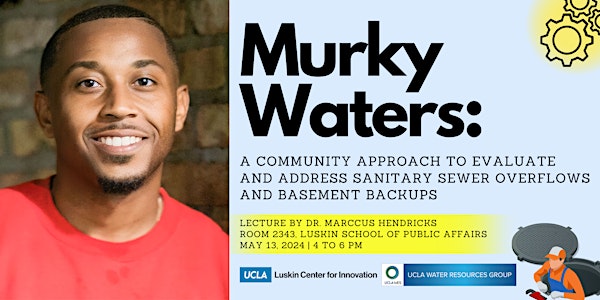
Dr. Marccus Hendricks Lecture: Murky Waters
A Community Approach to Evaluate and Address Sanitary Sewer Overflows and Basement Backups
Date and time
Location
Room 2343, Luskin School of Public Affairs
337 Charles E Young Drive East #Room 2343 Los Angeles, CA 90095Agenda
4:00 PM - 4:30 PM
Check-in and Reception
4:30 PM - 6:00 PM
Lecture and Q&A Session
About this event
- 2 hours
WHY ATTEND?
As we face the growing impacts of climate change on urban infrastructure, the dialogue surrounding resilient water systems has never been more pressing. We invite you to join an in-depth session with Dr. Marccus Hendricks, who will illuminate the intersections of public health, urban planning, and environmental justice in the face of increasing sanitary sewer overflows and basement backups.
GUIDELINES
Admission is free, but registration is required for each attendee.
PARKING and TRANSIT
Public transportation: Big Blue Bus (Routes 2 and 17), Culver CityBus (Line 6), Metro
Ride hailing locations: Dickson Court, Wyton
On-site parking available for $15 (Lot 3 or Lot 2)
Lot 3 Parking: Self-parking is available in UCLA Parking Structure 3, NORTH (levels 1-3).
Parking Rates at Pay-By-Space stations - All day: $15, After 4pm: $3-5 (1-2 hours), $10 (all night)
Pay-By-Space only has a limited number of stalls available.
LEARN MORE
Past studies in public health have shown a link between diseases and inadequate sanitation, such as waterborne illnesses and exposure to sewage-contaminated waters. The modern stormwater and sanitary systems are some of history's most lifesaving infrastructures. However, the failure to maintain and upgrade these systems, along with changing environmental conditions, has led to the reemergence of pre-modern conditions in cities worldwide, including Baltimore, Maryland. These risks may be particularly evident in marginalized urban neighborhoods with poorer stormwater and sanitation infrastructure and public works services. The Baltimore City sewer system frequently experiences overflows due to its old and failing system, and more frequent and intense rainfall events further overwhelm the system.
Dr. Marccus Hendricks will discuss the equity and environmental justice issues related to stormwater and sewer infrastructure planning. These issues result in vulnerable systems and households being impacted by flooding and exposed to untreated wastewater. Specifically, he will examine conceptual frameworks and provide context for how physical systems operate in a social world. He will also delve into an ongoing case study where he and his team use a mixed-method and community-driven approach to evaluate exposures from sanitary sewer overflows (SSO) and basement backups in Baltimore City. Lastly, Dr. Hendricks will highlight plans to leverage this work to shed light on these murky waters toward action and policy that integrates justice and participation into the remediation and future mitigation of these environmental risks.
ABOUT THE SPEAKER
Dr. Marccus D. Hendricks is an Associate Professor of Urban Studies and Planning and the Director of the Stormwater Infrastructure Resilience and Justice (SIRJ) Lab at the University of Maryland (UMD). His role extends into Civil and Environmental Engineering and the Maryland Institute for Applied Environmental Health. Dr. Hendricks' work is renowned for its examination of how social processes and development patterns result in hazardous human-built environments, specifically relating to urban stormwater management, flooding, and vulnerable infrastructures. His tenure as a Senior Advisor for Climate and Community Resilience in the Biden-Harris Administration has further amplified his contributions to creating resilient and equitable communities.
In his quest to forge resilient urban spaces, Dr. Hendricks has explored the intricate interplay between environmental justice and infrastructure, with a special focus on how community-driven strategies can address the risks and develop robust adaptation practices. He leverages diverse methodologies, from environmental sampling to visual inspections, advocating for a participatory approach that brings tangible improvements to both policy and the lived environment.
SPONSORED BY:
Land and Labor Acknowledgement
As a land grant institution, UCLA acknowledges the Gabrielino/Tongva peoples as the traditional land caretakers of Tovaangar (Los Angeles basin, So. Channel Islands) and are grateful to have the opportunity to work for the taraaxotam (Indigenous peoples) in this place. We pay our respects to Honuukvetam (Ancestors), elders, and ‘Eyoohiinkem (our relatives/relations) past, present and emerging.
We hold sacred the labor of enslaved Africans and immigrants, often exploited, indentured and underpaid, that built and continue to serve our institutions of higher education. We honor the labor and resistance of these ancestors, acknowledge that we benefit from this land and labor, and strive to work towards liberation for all.
Tickets
UCLA Students
0FREEUCLA Faculty/Staff
0FREEUCLA Alumni
0FREEGeneral Admission
0FREE